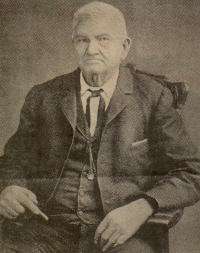
 Samuel Luman
was one of the best-equipped stage drivers on the Old Pike. His experience
covers many of the most exciting and interesting events in the road’s history.
He commenced his career as a stage driver in 1832. He tells of a collision with
highwaymen in the mountains, which was attended by thrilling details.
Samuel Luman
was one of the best-equipped stage drivers on the Old Pike. His experience
covers many of the most exciting and interesting events in the road’s history.
He commenced his career as a stage driver in 1832. He tells of a collision with
highwaymen in the mountains, which was attended by thrilling details.
The
following account was told in Thomas B. Searight’s book, The Old Pike, written
in 1894.
On the 12th of August 1834, Mr. Luman was on
the road between Piney Grove and Frostburg, with a mail and passenger coach
going east. After nightfall, and at a point studded by a thick growth of pine
trees, he was confronted by a party of footpads, five in number, and strange to
relate, one a woman, bent on felony.
The outlook was alarming.Luman
carried no firearms, and there was but one weapon among his passengers, a small,
brass pistol, not brought into requisition, as the sequel shows.
The
assailants had thrown across the road an obstruction like a rude fence, made of
logs, stumps and brush. As Lumen’s trusty leaders approached the obstruction,
one of the highwaymen stepped out from his cover and seized a bridle, and the
coach was stopped. The assailant ordered Luman to descend from his seat and
surrender his charge. This he very politely, but very decidedly, declined to do.
"What do you want?" queried Luman, with seeming innocence. "We are traders,"
was the response.
"Well" rejoined Luman, coolly, "I have nothing to
trade; I am satisfied with my trappings, and not desirous of exchanging them".
During this little parley the would-be robber, who held a leader by the
bridle, cried out to a partner in crime, who was near at hand, though under
cover of darkness, to shoot the driver, and denounced him as a coward for not
firing. The party thus addressed then leveled a pistol at Luman and pulled the
trigger, but the result was nothing more than a "snap", the night air being damp
and the powder failing to explode. These favorable surroundings, no doubt, saved
Luman’s life.
The Footpads at the heads of the leaders (horses) had, in
the confusion and excitement of the moment, had turned the horses squarely
around, so that the leaders faced west, while the wheel horses stood to the
east. In this conjuncture the party in charge of the leaders undertook to
unhitch them, and to guard against the movements of Luman, wrapped a driving
rein tightly around one of his arms. This was Luman’s opportunity, and summoning
all his resources, he poured a volley of stinging lashes upon his antagonist,
smiting him on the face and arm, alternately, and most vigorously. The bandit
winced, and soon relinquished his grasp, when, almost in the twinkling of an
eye, the team under Luman’s skillful hands started up on a full run, leaping the
improvised fence, and speeding on, leaving the footpads behind to lament their
discomfiture.
Mr. Luman relates that in crossing the improvised fence, he
fairly trembled for the fate of himself and passengers, as the coach was within
an ace of capsizing. He also states that the ruffian who seized his leader wore
a gown that covered his whole person, tied around the middle of his body with a
belt, and that another of his assailants wore a white vest, dark pantaloons, and
covered his face with a black mask. The other three kept in the background
during the attack, so that he is unable to recall their appearance.
Mr.
Luman further relates that when the first assault was made on him, he apprized
his passengers of the impending danger and besought their assistance, but they
crouched in their seats and made no effort to aid him or defend themselves. They
were western merchants going east to buy goods, and had among them as much as
sixty thousand dollars in cash.
When the coach arrived safety at the
Highland House, Frostburg, George Evans at that time the proprietor thereof, the
grateful passengers "took up" a collection for the benefit of their courageous
and faithful driver and deliverer, but Luman say the sum proffered was so
ludicrously small that he declined to receive it, and ever thereafter regarded
that lot of passengers as a "mean set."
Contributed by Lawson L. "Buddy" Duckworth
Source: Heritage Weekly of Frostburg, Maryland, dated 14 Mar 1977.
Garrett County MDGenWeb Copyright
Design by Templates in Time
This page was last updated
10/11/2023